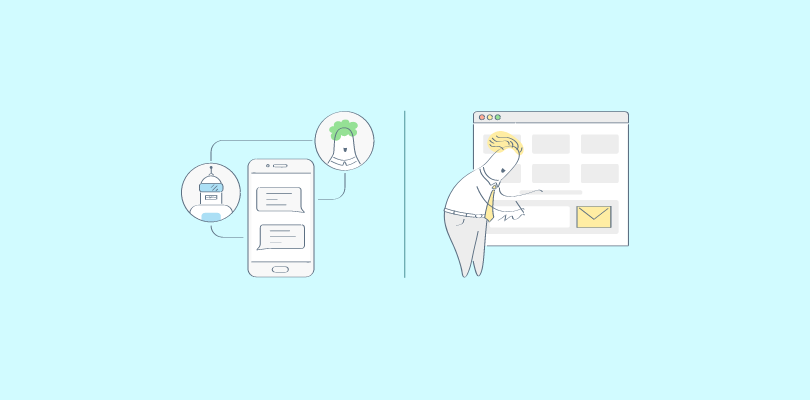“One customer well taken care of could be more valuable than $10,000 worth of advertising.”
– Jim Rohn
In any business, building strong relationships with clients is crucial for long-term success. But what exactly is the client relationship management process, and how can it benefit your business?
At its core, the client relationship management process involves strategies and practices designed to foster positive client interactions, improve satisfaction, and build loyalty. It’s about understanding your client’s needs and preferences and tailoring your approach to meet them.
In this blog, we’ll explore the best practices for managing client relationships and how they can transform your business.
What Is Client Relationship Management?
Client Relationship Management (CRM) is essential for building and maintaining strong, lasting client relationships. It’s a strategic approach that helps businesses better understand their customers’ needs, delivering a more personalized and engaging experience.
The ultimate goal? Fostering loyalty and long-term engagement.
Here’s how the client relationship management process works:
- Data Collection: Gather comprehensive customer data, including demographics, purchase history, and preferences. This data forms the foundation for understanding who your clients are and what they need.
- Behavior Analysis: Analyze customer behavior to identify patterns and trends. This can include tracking how often they purchase, what products they prefer, and how they interact with your brand.
- Personalized Interactions: Use the insights gained from data and behavior analysis to tailor your communications and offerings. This might involve personalized marketing messages, customized product recommendations, or special offers based on past behavior.
- Enhancing Customer Experience: Focus on improving every touchpoint in the customer journey, from the first interaction to post-purchase support. A seamless and satisfying experience encourages repeat business and positive word-of-mouth.
By prioritizing the customer’s experience and satisfaction, businesses can build a strong reputation and foster lasting loyalty. CRM isn’t just about managing data; it’s about creating meaningful and successful relationships that benefit both the customer and the business.
Read more: What Is CRM? [The Ultimate Guide for Businesses]
What Are the Benefits of Client Relationship Management?
Client relationship management is more than just a buzzword; it’s a vital process for any business that values long-term success. Here’s a simple rundown of the benefits of an effective client relationship model:
1. Better Customer Insights
A CRM system offers detailed reports and insights into customer behavior, preferences, and history. This data is invaluable for understanding what drives your customers, what they like or dislike, and how they interact with your business.
With this information, you can design marketing plans to meet customer needs, leading to more personalized communication and better customer experience.
2. Improved Communication
CRM systems ensure all client interactions are logged and accessible to everyone in the organization. This unified access means that any team member can quickly review a client’s history, preferences, and past issues, enabling more consistent and informed communication.
Whether a customer contacts support, sales, or another department, the staff can provide a seamless experience without the client having to repeat the information.
3. Enhanced Customer Retention
The client relationship management process involves monitoring and analyzing customer interactions to identify any signs of dissatisfaction or potential churn. By catching these issues early, you can proactively address concerns, offer solutions, and improve the overall customer experience.
This approach not only resolves problems before they become critical but also demonstrates to customers that their feedback is valued, thereby enhancing loyalty and retention rates.
Read more: CRM Software Can Help Increase Customer Retention for Your Business
4. Increased Revenue Streams
CRM systems are instrumental in identifying opportunities for upselling and cross-selling. By analyzing customer data, businesses can spot trends and preferences that indicate which products or services may appeal to specific customers.
This filtered approach allows for more effective marketing and sales efforts, as businesses can present relevant offers at the right time, increasing the likelihood of additional sales and boosting overall revenue.
5. Improved Task Management
One of CRM systems’ prime advantages is the automation of routine tasks. Functions such as sending follow-up emails, scheduling appointments, and data entry can be automated, freeing up valuable time for employees to focus on more strategic activities.
Automation also reduces the risk of human error, ensuring that tasks are completed accurately and consistently, which improves efficiency and productivity across the organization.
6. Optimized Contact Management
A CRM system serves as a centralized repository for all client information, making it easier to manage and access contact data. This centralization ensures that all team members have the most current and accurate information at their fingertips, facilitating better decision-making and more effective communication.
It also helps maintain data integrity and compliance, as you can easily track and manage contact information in accordance with relevant regulations.
7. Personalized Customer Support
You can provide highly personalized service to your clients with detailed information about each client’s preferences, history, and interactions. This could include customized product recommendations, personalized communication styles, or special offers that resonate with individual clients.
Personalized service not only enhances customer satisfaction but also fosters a deeper connection with the brand, encouraging repeat business and word-of-mouth referrals.
8. Enhanced Sales Pipeline Management
A CRM system streamlines the sales process by providing robust tools for managing the sales pipeline. It helps sales teams organize leads, track progress at each stage, and forecast outcomes accurately. This structured approach enables sales representatives to prioritize high-potential prospects, manage their pipeline efficiently, and close deals faster.
CRM systems also integrate seamlessly with other tools, such as email and calendars, simplifying scheduling follow-ups and maintaining consistent communication. This integration ensures that all interactions are logged and easily accessible, enhancing the overall client relationship management process.
For a deeper understanding of how CRM can enhance pipeline management and streamline your sales process, check out this informative video:
9. Improved Collaboration
CRM systems facilitate better team collaboration by centralizing customer information and making it accessible to all relevant departments. This transparency ensures everyone is on the same page, whether in sales, marketing, or customer support.
Enhanced collaboration leads to more coordinated efforts and a more unified approach to customer service, ultimately benefiting the customer experience.
10. Expanded Scalability
As businesses grow, so do their customer numbers and data management needs. A CRM system can scale with your business, accommodating more users, customers, and data without sacrificing performance.
This scalability ensures that businesses can continue to provide excellent customer service and maintain efficient processes even as they expand.
Read more: Benefits of CRM: Why CRM Is Important for Your Business
10 Best Practices for Client Relationship Management
Developing strong business relationships with clients is key to any business’s success. Here are some customer relationship best practices and strategies to manage customer relationships effectively, ensuring a smooth client relationship management process:
1. Personalize Your Communication
It’s essential to tailor your interactions based on each customer’s unique preferences, history, and needs. By addressing them by their name, recalling past conversations, and suggesting products or services that suit their specific requirements, you make them feel valued and understood.
Personalization can extend to email marketing, customer support interactions, and even in-app messages, creating a more intimate and engaging customer experience.
2. Be an Active Listener
This involves not just hearing what your customers are saying but truly understanding their concerns, feedback, and needs. By asking follow-up questions and clarifying any doubts, you demonstrate that you genuinely care about their input.
This technique helps identify pain points and areas for improvement, which can lead to better product development and service offerings. It also builds trust, as customers feel their voices are heard and respected.
3. Follow-Up Consistently
After a sale or customer service interaction, follow up to ensure the customer’s satisfaction. This could involve checking in on their experience with a recent purchase, resolving any issues they may have encountered, or simply thanking them for their business.
Regular follow-ups show that you are committed to providing ongoing support and value. They also provide opportunities to upsell or cross-sell products or services based on the customer’s evolving needs.
Read more: How to Write Effective Follow-up Emails to Clients
4. Use CRM Technology
Implementing CRM systems is important in the modern business environment. These tools help manage customer interactions throughout the client relationship management process.
They enable you to store customer data, track purchase history, and automate communication, such as sending personalized emails or reminders. By using technology, you can provide a seamless and consistent experience, regardless of how customers choose to interact with your business.
5. Educate & Inform
Offering valuable content such as how-to guides, tutorials, webinars, and newsletters keeps customers informed and engaged. This strategy positions your business as a knowledgeable and helpful resource.
Providing educational content can help customers get more value out of your products or services, solve common problems, and stay updated on the latest trends and features. It also encourages customer loyalty by showing that you are invested in their success.
6. Seek Feedback
Actively seek customer feedback through surveys, reviews, and direct conversations. Use this feedback to improve products, services, and customer support.
Demonstrating that you listen to and act on customer feedback shows that you value their input and are committed to continuous improvement.
7. Engage in Relationship Marketing
Focus on creating impactful connections with customers rather than just pushing for sales. This involves understanding their long-term needs and interests, offering valuable content, and creating experiences that build loyalty.
Relationship marketing emphasizes ongoing engagement and satisfaction, turning customers into loyal advocates who are more likely to refer your business to others.
8. Track & Manage Communication
Keep a detailed record of customer interactions to ensure consistency and follow-up. This includes tracking emails, calls, and messages and noting any special requests or issues.
Responding promptly and appropriately based on this history helps maintain a positive relationship. It also shows your clients that you are attentive and responsive to their needs.
9. Appreciate Loyalty
Recognizing and rewarding loyal customers can significantly strengthen your relationship with them. This can be done through loyalty programs, exclusive discounts, special offers, or personalized thank-you notes.
By acknowledging their loyalty, you make customers feel special and appreciated, enhancing their sense of belonging and attachment to your brand. This practice not only retains existing customers but can also encourage them to advocate for your business among their peers.
10. Build Trust & Credibility
Trust is fundamental in any relationship, and it takes time to develop. Consistently delivering on promises, being transparent about policies, and handling issues professionally all contribute to building credibility.
Regularly sharing useful and accurate information, such as product updates or industry insights, also helps establish your business as a reliable source of knowledge and support.
Enhance Sales Performance with CRM Technology
Leveraging a CRM system is essential for truly mastering the client relationship management process. A reliable CRM tool can help you organize client information, streamline communications, and automate follow-ups.
By using these systems, you can ensure that no detail is overlooked and that every interaction is meaningful and efficient.
By integrating a CRM system like BIGContacts into your business, you’re not just managing relationships—you’re building a foundation for long-term success.
What’s great about BIGContacts is that you can sign up for free and explore its features without any commitment. This lets you see firsthand how it can streamline your workflow and improve client satisfaction.
Frequently Asked Questions
Which is the best client relationship management software?
The best client relationship management software depends on your specific needs. For small businesses, BIGContacts CRM is a great free option with powerful features. It is a great tool if you’re looking for something more customizable. Ultimately, it’s about finding the right fit for your workflow and budget.
What does a client relationship manager do?
A client relationship manager helps businesses build and maintain strong connections with their clients. They focus on understanding client needs, providing personalized service, and ensuring satisfaction. Their role includes regular communication, addressing concerns, and finding ways to enhance the client’s experience. Essentially, they are the bridge between the company and its clients, fostering loyalty and trust.
What is the key to a successful client relationship?
The key to a successful customer relationship is clear communication, consistency, and genuine care. Always listen to your clients’ needs, keep them informed, and proactively solve issues. Building trust through these practices creates a strong, positive connection, which fosters loyalty and long-term success.
FREE. All Features. FOREVER!
Try our Forever FREE account with all premium features!








